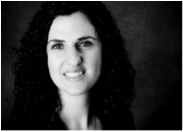
Huda Al-Marashi’s piece in Love InshAllah is an excerpt from a manuscript she’s been working on for six years. She first started writing after September 11th, and relates her writing journey: “I started writing scenes that spoke to the experience of growing up Muslim and American in California, but over time, I realized I was writing to an agenda rather than telling a unified story. I had to step back and think about the story I most wanted to tell, and I knew that was the story of my marriage.”
An excerpt from Huda’s story, “Otherwise Engaged”:
“After dinner one evening, my mom, Zena, and I sat around the breakfast nook table with a stack of phyllo dough in front of each of us. We dug our spoons into a pan of sautéed spinach and feta cheese and then dropped their contents onto the center of a strip of pastry.
Bringing up the sides of the dough around a dollop of spinach, Zena said, “She’s only eighteen. You should’ve waited. She is beautiful, mashAllah. It’s nice for a girl to see how many suitors she can get.”
“I’m not trying to sell a sheep,” Mama answered. “What does it matter how many people come?”
“You know what I mean. It’s nice for a girl to feel wanted, and then her future in-laws will value her more when they know how many people came for her.”
“They already know what they’re getting. They’ve seen all kinds of girls. They know there is nobody like my Huddie.”
“Of course there’s nobody like her. That’s why I’m saying maybe you could’ve gotten everything: somebody with a good future, a good family, maybe sayyid.””
To read the rest of Huda’s story, order Love InshAllah today.
Why were you drawn to this project?
This project relates directly to themes I am exploring in my own work. Our love stories are our most relatable journeys, especially in a political climate bent on demonizing Muslims.
What was the most challenging part of sharing your story?
Writing is such a solitary activity that owning my work in a public way is a challenge. Talking about love and attraction has always been considered ayb or shameful among conservative Arab Muslims. I am constantly torn between the writer who strongly believes in her work and the girl who fears offending her elders. This sense of conflict is only compounded by the fact that I must implicate my husband, my in-laws, and my family in order to tell my story. I hope that I bring them into my literary world with the reverence that such breaches of their privacy deserve. Ultimately, I carry on because I believe the good that comes from sharing our stories far outweighs the consequences of exposure.
If there’s one thing you hope that readers will take away from your story, what is it?
As a Muslim, I hope my story has challenged stereotypes. As an individual, I hope I have shown the tenderness and warmth that can exist between a couple that did not date prior to their engagement. And as a writer participating within this collection, I hope I have given our readers a sense of the diversity within the Muslim-American experience.
Anything else you’d like to share?
I love that this project broadens our understanding of love and the many different ways in which people find love. It reminds me of a time when a cosmetologist asked me if my marriage was arranged. I told her that it was more complicated than that; I’d known my husband since I was six years old. She asked, “Isn’t that like marrying your brother?” Her comment stayed with me for a long time. I resented the suggestion that my marriage had been in some way incestuous, but I also realized that her questions revealed a deeper misunderstanding. The cosmetologist simply could not imagine the gender-segregated life I had led. She could not picture a world where I could know my husband since childhood and yet hardly know him at all. Love, Inshallah expands our notions of love and courtship in a way that I think is vital.











